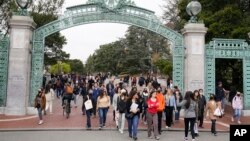Student Union
New in the Glossary of Confusing Words: Degrees You Can Earn in the US
Here are the types of academic degrees you might encounter in U.S. higher education, and what each one means:
Certificate – Recognition for completing a non-degree program. Some colleges or universities also allow you to pursue a certificate while studying for a degree in another field.
Associate’s – The degree given by a community or junior college for completing two years of full-time undergraduate study (or the equivalent). An associate’s degree can be tied to a specific career/technical skill, or it can be a transfer degree, counting towards the completion of a bachelor’s degree at another institution.
Bachelor’s – The degree awarded by a college or university for completing four years of undergraduate study (or the equivalent). The most common types of bachelor’s degrees are the bachelor of arts (B.A. or A.B.) and bachelor of science (B.S.), but you could see any number of other specialized bachelor’s degrees.
Master’s – The degree awarded by a graduate school for completing postgraduate study (postgraduate = after the bachelor’s degree). Most master’s degrees take one or two years of full-time study to complete. Like bachelor’s degrees, there are many specialized types of master’s degrees, but the most common are the master of arts (M.A.), master of science (M.S.) and master of business administration (M.B.A.).
Professional Degree – Some careers require a specialized professional degree in order to practice in that field. Examples are the doctor of medicine (M.D.), required for medical doctors, and the juris doctor (J.D.), required for lawyers. Most (but not all) professional degrees are postgraduate degrees requiring you to get a bachelor's first.
Doctorate (Ph.D.) – The highest academic degree awarded by a university. A Ph.D. usually requires at least 3 years of graduate study beyond the last degree received, and completion of oral/written exams and a dissertation of original research. We’ve actually covered the Ph.D. before in the Glossary, in the context of explaining the difference between a Ph.D. doctor and a medical doctor (short answer: you call them both doctors, but they’re two totally different things).
Have you come across a word related to education in the U.S. that you want to see defined in our Glossary of Confusing Words? Let us know in the comments or by using the form below.
Loading...
See all News Updates of the Day
Universities in Middle East building research relationships with China

As China bolsters research relationships with universities in the Middle East, the United States has taken notice – especially when that research involves artificial intelligence.
Reporting for University World News, Yojana Sharma has the story. (March 2024)
Tips for staying safe while studying in the US

Recent news events have raised safety concerns among some international students studying in the United States.
Adarsh Khandelwal, writing in the India Times, has tips for staying safe from the moment you arrive until the day you complete your studies. (March 2024)
Some colleges are making digital literacy classes mandatory

A 2019 study by Stanford found that most college students can’t tell the difference between real and fake news articles. Amid rampant online disinformation, and the threat of AI-generated images, some schools are making students learn “digital literacy” to graduate.
Lauren Coffeey reports for Inside Higher Ed. (March 2024)
With federal student aid delays, students aren’t sure what college will cost

The U.S. Department of Education’s federal student aid form (FAFSA) experienced serious glitches and delays this year.
Now, many students have been admitted to college, but don’t know how much money they’ll need to attend.
Read the story from Susan Svrluga and Danielle Douglas-Gabriel for The Washington Post. (March 2024)
Senator draws attention to universities that haven’t returned remains

More than 70 U.S. universities continue to hold human remains taken from Native American burial sites, although those remains were supposed to be returned 30 years ago.
Jennifer Bendery writes in Huffington Post that one senator has been using his position in an attempt to shame universities into returning remains and artifacts. (April 2024)







